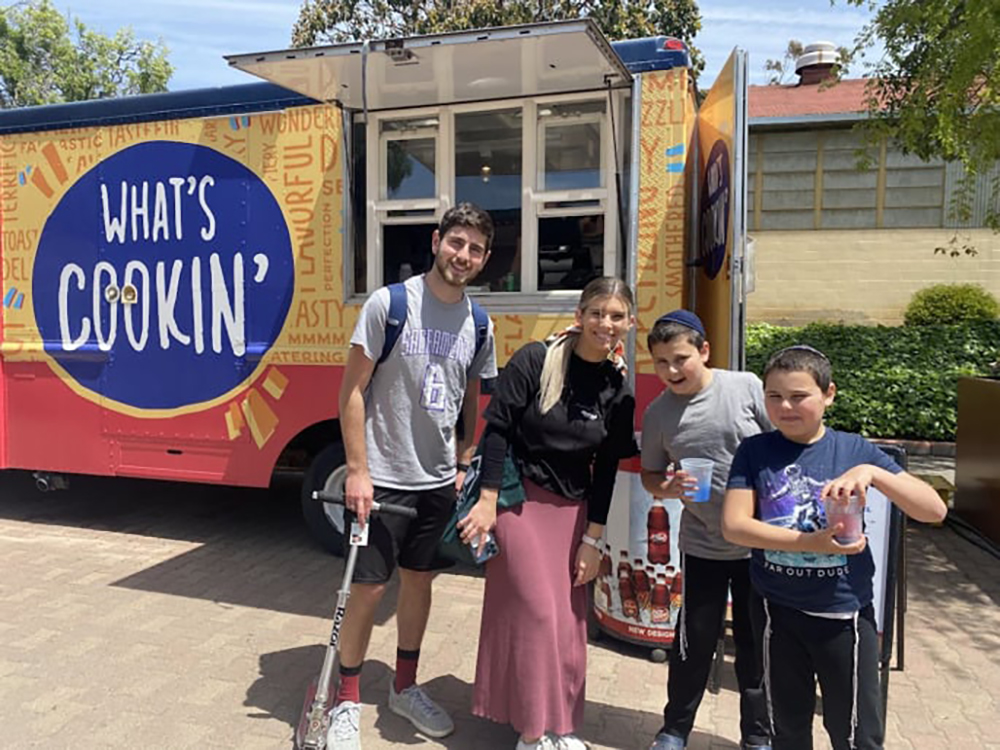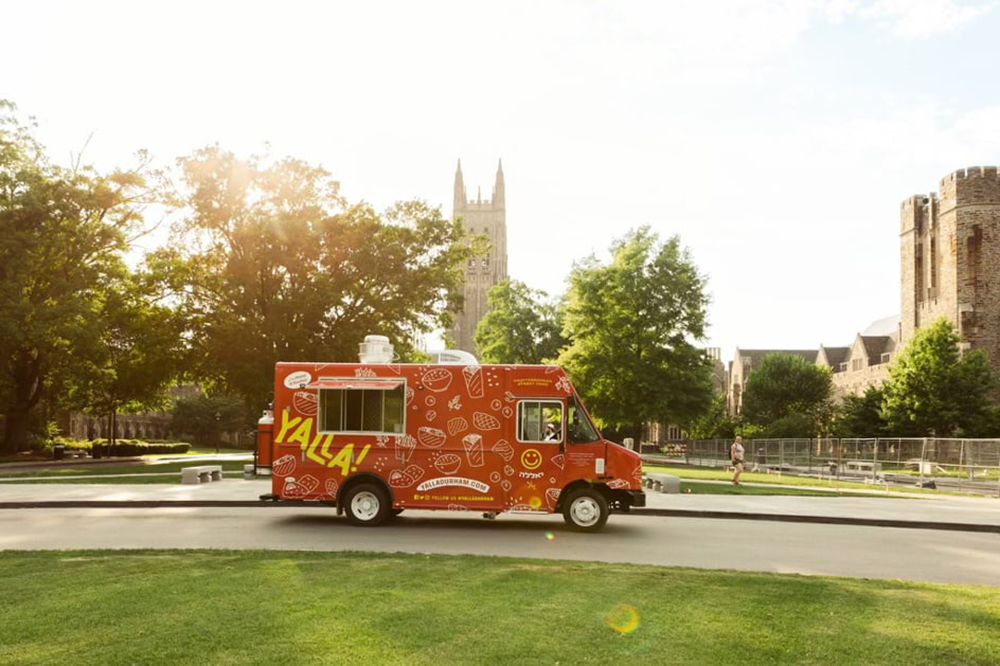|
Getting your Trinity Audio player ready...
|
A Chabad initiative brings kosher to Jews of Utah, North Carolina and beyond
By: Ellen Braunstein
You may not think of Salt Lake City as a place for an award-winning kosher falafel, but thanks to Chabad’s bright green Yalla food truck, Utahns can now easily dig into fresh, hot, certified kosher Mediterranean food.
The kosher food truck has emerged as a substitute for traditional brick-and-mortar eateries that the small Jewish community of 6,000 couldn’t sustain. It follows the ways of similar food trucks that have popped up across the country and beyond.
Rabbi Avremi Zippel, director of development at Chabad-Lubavitch of Utah, partnered with purveyor Elad Ogorek and helped him procure a glatt kosher certification for an Israeli-style food truck.
“In an act of Divine providence, Elad was looking to move the food truck into the Salt Lake City area,” Zippel told Chabad.org.

After teaming with Ogorek, sourcing a truck that could be repurposed into a mini, portable kitchen and then establishing the restaurant, Zippel now manages the Yalla food truck operation, which has since expanded its offerings to cater Shabbat meals and other private events.
But while as a rabbi Zippel was no stranger to logistics and well placed to organize kosher certification, this itself does not guarantee that the food would be high-quality and tasty. Ogorek was the impetus for that by curating an award-winning menu that includes Middle-Eastern staples like schnitzel, grilled chicken, beef kebabs, falafel and shawarma. “I may run day-to-day operations, but Elad is the creative spirit,” Zippel affirmed.
Yalla has been thriving for two and a half years. Four employees staff the 18-foot-long food truck, which on an average day can be found in the Chabad center parking lot, alongside a few benches. The food is prepped in Chabad’s adjacent kosher commercial kitchen and then cooked in the truck.
“It’s been extremely well received in the local community by Jews and non-Jews,” Zippel said. “Chabad wanted to commit itself to offering kosher food as an option for locals, visitors and tourists coming to the national parks and ski resorts.”
And locals aren’t the only ones impressed by the offerings. The year it opened, in 2022, it won multiple awards, including being named Top Five Can’t Miss Food Truck in Salt Lake City by the local ABC affiliate. In 2024 it won, among other awards, Best of Salt Lake City in the Middle Eastern Restaurant category.

Kosher in High Demand
Nearly 50 years ago, in the summer of 1975, the Rebbe, Rabbi Menachem M. Schneerson, of righteous memory, launched the international Kosher Campaign, the latest of what would become the Ten Mitzvah Campaigns.
“It is explained in holy Jewish books … that a person’s makeup is greatly affected by what he eats and drinks,” the Rebbe explained at the time. “The food becomes a part of his blood and flesh, and just like it affects one’s physical health, it affects one’s spiritual health as well.”
As part of this campaign the Rebbe established a special fund which would offset the costs incurred by an individual koshering their home, and supported the numerous endeavors spearheaded by Chabad emissaries to make the world of kosher more accessible, from kosher cook books to kosher meal plans on university campuses.
The food truck is the Kosher Campaign’s latest tool. It is particularly well-suited for university campuses, where young people are more used to the idea of buying hot food off of a truck than perhaps some of their elders.
Duke University is another example of a Chabad center fulfilling the growing needs for a kosher food option. Duke has in recent years seen its Jewish student population rise, and in 2021 inaugurated the 24,000-square-foot Fleishman House as the home of Rohr Chabad at Duke Undergrads. Jewish life on campus has exploded ever since.
To meet the burgeoning Jewish community’s kosher food needs, Chabad established its very own Yalla kosher food truck.
“We’re the first truck they’ve allowed on campus full-time,” said Rabbi Nossen Fellig, co-director of Chabad at Duke. “A lot more students, thankfully, are eating kosher because of it and those who aren’t fully kosher yet are having a lot more kosher meals.”
On campus for two years, it was just a matter of time before Yalla would enter into the public consciousness when it made news a few weeks ago when Jewish comedian and actor Jerry Seinfeld delivered the commencement address on May 12 at Duke, where his son Julian is a rising senior, he gave a shout-out to the campus’ kosher food truck.
“And I know you are not even really listening to this speech,” Seinfeld told the assembled graduates. “That’s OK. I wouldn’t either. You’re graduating, you’re thinking of yourself or timing your mobile order from the Yalla truck, and that’s all cool … .”
The speech quickly went viral on social media, with that moment being seen as a simple but strong message of support to the Jewish community: There is no reason to hide your identity, not when it comes to big things like Jewish holidays or the like, and not in the day-to-day of eating a good kosher lunch either.

A Great Model
Salt Lake City and Durham are not the only remote Jewish communities with their own kosher food trucks. Back in 2016, Rabbi Shlomo Rothstein, who directs the Rohr Chabad House at Vanderbilt, in Nashville, Tenn., teamed up with the late New York attorney Ken Freeling to establish what is today known as “Holy Smokes,” a food truck offering southern and traditional Jewish classics. Serving out of a retrofitted 1971 airstream trailer, the truck has ever since been making kosher food more accessible and more desirable on and off campus, and has become a favorite gathering point for Jewish students to enjoy a good meal and explore their Jewish heritage.
At Cal Poly, students await the distinctive aroma of kosher cooking that heralds the arrival of the food truck aptly named “What’s Cookin Kosher.” After talks with campus administration to build a dedicated kosher kitchen fell through, Rabbi Chaim Leib Hilel, who directs Chabad of SLO & Cal Poly, in remote San Luis Obispo, Calif., installed the truck as a unique way to ensure the students he serves have access to kosher food.
Meanwhile, in Jacksonville, Fla., a brick-and-mortar kosher franchise called Gili’s Kitchen has teamed up with various Chabad Centres to bring kosher food to the American south, most recently with Chabad at University of Central Florida. In the past, it has even ventured out to Jewish communities in North Orlando, Greater Daytona and as far out as Savannah, Ga.
Zippel calls the kosher food truck a great model for other similarly-sized Jewish communities. “Committing to making good kosher food available is not something only possible in a larger community of tens or hundreds of thousands of Jews,” the rabbi said.
Zippel has been contacted by Chabad emissaries (shluchim) worldwide who are keen on bringing comparable food trucks to their communities. “It’s been a tremendous asset in bringing visibility and awareness around kosher food to the local community,” he explained. “I think that the demand for kosher food increases once it becomes readily available.”
The Yalla truck has taken part in food truck rallies and festivals in and around Salt Lake—never on Shabbat, of course.
Having a local kosher option opens people’s eyes to what it would mean to commit to a kosher lifestyle, according to Zippel. “It has given a sense of pride in being kosher observant,” he said. “It’s not that crazy of a lifestyle. It’s something that brings blessing and sanctity to a Jewish home.”
Could the food truck operation potentially expand and open a sit-down restaurant in the future? “I certainly didn’t think when we opened we would be getting the recognition and attention that we’re garnering on a local level,” Zippel said. “I truly believe that with G‑d’s help, hopefully those blessings will continue to spur forward commitment to kosher.”





